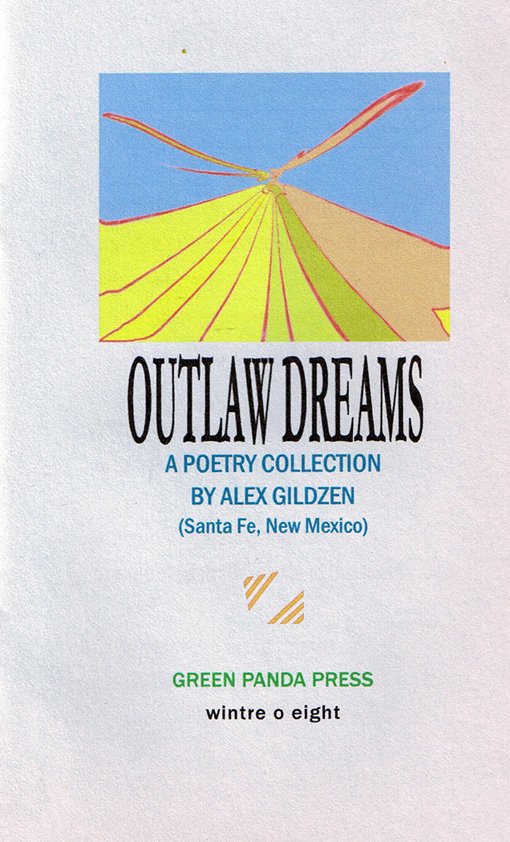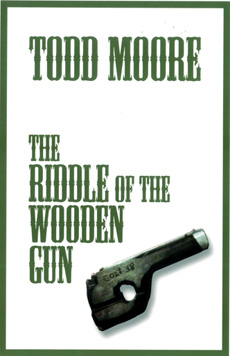
Alex Gildzen | Photo: Stathis Orphanos

I can’t write about Alex Gildzen without mentioning Paul Metcalf. I think it was Paul who first suggested that Alex write me and that was well over twenty years ago. For the record, Paul Metcalf was Herman Melville’s great grandson and a first rate, though badly neglected novelist and poet. His novel GENOA and long poem APALACHE are as good as anything Charles Olson, David Jones, or Thomas McGrath wrote in the third quarter of the twentieth century. Some critic with vision and guts really needs to explore and write about the work of Paul Metcalf.
As for Alex Gildzen, he’s an Outlaw Poet. I make that statement unequivocally, knowing Alex and his poetry since the eighties. Making that statement might get me into a little trouble but it’s like Raymond Chandler wrote. Trouble is my business. And, before I go further I need to say that Outlaw Poetry is not just about poet icons who push the cultural and aesthetic envelope right to the edge. Outlaw Poetry encompasses a whole generation of poets who have said and are saying no to a corrupt university/publishing establishment which honors only the writing degree darlings who use university teaching positions as bases of power.
Gildzen, like Edward Field before him, mines the Hollywood Dream Factory. In some ways, this is still a largely ignored area for a poet to work in. And, I think, this is largely due to the fact that for most poets mythology means going back to the Greek myths, the Roman creation stories. Just mention the word myth and see how many people will recall Homer, Sophocles, Catullus, Virgil. That is, the well read people. That’s why I love movies like THE MALTESE FALCON and THE BIG SLEEP. I need to hear the american lingo in my ear again, I need dialogue that washes it all clean, that makes me want to see movies that really are movies and read poems that don’t bore the living shit right out of me.
Or, bring up american mythology, how about Daniel Boone, Davy Crockett, John Henry, Pecos Bill? And, of course, there is that solid american bible of mythology, Richard Slotkin’s REGENERATION THROUGH VIOLENCE. For some peculiar reason, pop culture in america has been deleted from much so called serious poetry. That is, at least until Edward Field wrote STAND UP, FRIEND, WITH ME. You can ransack most poetry written before 1950 and you will find very little with regard to the movies.
And, yet, regardless of what our serious (and most boring critics) have written, it is the movies which have provided our novelists and our poets with the raw material for something like the archetypal american dream. Before Field, the only really great novelists to tap into archetypal Hollywood were Nathanael West who wrote THE DAY OF THE LOCUST and F. Scott Fitzgerald who was still writing THE LAST TYCOON when he died. Somehow West and Fitzgerald realized before almost anyone else that the Dream Factory on the coast was onto something. Something so subversively american it was like receiving communion and a blowjob, both at the same time.

By the time Gildzen started to write poetry, there were a few books he could consider as predecessors, as influences. Of course, Gildzen was no stranger to the vast storehouse of Hollywood myths, histories, stories, tall tales, and juicy bits of gossip attached to the Hollywood environs. He had grown up to Hollywood, had seen all the important films of his childhood, had read all the necessary books about Hollywood, had even met some movie stars. Somehow Gildzen was able himself into the central core of Hollywood’s collective unconscious.
Collective unconscious, of course, is a Jungian term. However, I don’t think even Carl Jung could have predicted the impact that the dream factory would have on the contemporary fantasy and dream world of, not just americans, but people all over the world. More often than not, america is credited with the invention of jazz. It has long been called the only art form that is truly american. I’d like to amend that list to the movies as well. Not just the movies, but the images created by the movies. I will never be able to think of the film STAGECOACH without seeing John Wayne twirl that Winchester around when he stops that coach which is heading toward Lordsburg. And, whenever I think of BONNIE AND CLYDE I’ll always see that bullet riddled car and those bodies rolling in the gunfire. And, Warren Oates behind that machine gun in THE WILD BUNCH sums up the enormous and pervasive violence possible in contemporary america.
So, when I mention the Dream Factory of america, what I am really talking about is the place where all of us go to kick through the trash heap of images that we all desperately need to recycle through our poems. And, Alex Gildzen knows that this is the central fact of american poetry, the central fact of dreaming in america. Gildzen’s poetry is as dependent upon these images as Cavafy’s poetry was dependent upon the ancient history and myth of the Alexandrian world. And, because Gildzen knows that the Dream Factory is the central fact and myth for american poetry, this knowledge places him at the periphery of what is acceptable in the polite world of writing schools and mainstream publishing. And, it is also this knowledge that has made Gildzen an Outlaw Poet.
The Outlaw Poet works best at the periphery of a society, not at the center. Baudelaire stood right at the margins, at the very edge of French society in the nineteenth century. Rimbaud was way outside the margins. In fact, he moved the margins farther than anyone else at that time. If, as a poet, you stand at the center of your culture you will never be an Outlaw Poet. Eliot could never have been an Outlaw Poet. Walt Whitman will never be anything but an Outlaw Poet.
 One thing to keep in mind is that no Outlaw Poet is like any other. Every Outlaw Poet is different from every other one both in life style and the way that he stands against the culture. Allen Ginsberg and Jack Micheline were both Outlaws but they were both as unalike as any two people could have been, both in their work and in their life styles. The same goes for Tony Moffeit and Kell Robertson. If anything Tony is a kind of blues/shaman poet while Kell is the original half horse half alligator american wild man poet. The same goes for S. A. Griffin and Alex Gildzen. Both poets are the pure products of the Dream Factory Myth. But, they mine that myth so differently. And, they both know that inside the flicker of that movie light there is a powerful darkness that most of us have only just begun to tap into.
One thing to keep in mind is that no Outlaw Poet is like any other. Every Outlaw Poet is different from every other one both in life style and the way that he stands against the culture. Allen Ginsberg and Jack Micheline were both Outlaws but they were both as unalike as any two people could have been, both in their work and in their life styles. The same goes for Tony Moffeit and Kell Robertson. If anything Tony is a kind of blues/shaman poet while Kell is the original half horse half alligator american wild man poet. The same goes for S. A. Griffin and Alex Gildzen. Both poets are the pure products of the Dream Factory Myth. But, they mine that myth so differently. And, they both know that inside the flicker of that movie light there is a powerful darkness that most of us have only just begun to tap into.

Alex Gildzen
born April 25, 1943 in Monterey, California, is a poet, mail artist, and blogger who is best known for his autobiography Alex in Movieland, an experiment in list poems. Gildzen grew up in Elyria, Ohio, graduating from Elyria High School in 1961. He then enrolled at Kent State University, earning a BA in journalism and an MA in English in 1966. Gildzen then took a position with the University News Service department, covering the university’s cultural scene. He was on the Commons on May 4, 1970 when four students were killed by the National Guard during an anti-war demonstration.
 After that event, Gildzen decided to make a career change and was hired by then-Curator Dean Keller to assist him in the univeristy library’s Special Collections Department in 1971. During his tenure in Special Collections, Gildzen acquired the archives of the Open Theater, as well as the papers of its director Joseph Chaikin and major playwright Jean-Claude van Itallie. He also acquired the papers of Group Theater member Robert Lewis, film historians Gerald Mast and James Robert Parish, and silent screen star Lois Wilson. He retired as Curator in 1993 after thirty years of service at Kent State.
After that event, Gildzen decided to make a career change and was hired by then-Curator Dean Keller to assist him in the univeristy library’s Special Collections Department in 1971. During his tenure in Special Collections, Gildzen acquired the archives of the Open Theater, as well as the papers of its director Joseph Chaikin and major playwright Jean-Claude van Itallie. He also acquired the papers of Group Theater member Robert Lewis, film historians Gerald Mast and James Robert Parish, and silent screen star Lois Wilson. He retired as Curator in 1993 after thirty years of service at Kent State.
Gildzen’s first book, Into the Sea, was published by Abraxas Press in 1969. His selected poems The Avalanche of Time was published by North Atlantic Books in 1986. He became involved in mail art in the 1970s and produced a number of works, notably Postcard Memoirs. He visited Santa Fe for the first time at the end of 1990; he moved there four years later. During the1990s, Gildzen produced a pop music concert and AIDS benefit and had two of his plays produced. Since his retirement, he has continued a robust career as a poet and mail artist, particularly utilizing the Internet as a medium. His blog is “Arroyo Chamisa” and he appears on You Tube in videos reading his work.

Bibliography:
- Gildzen at 50: A Celebration (1993) edited by Dimitris Karageorgiou
Selected Works by
- Into the Sea (1969)
- “Twenty Sonnets Bound in Gold” 1972)
- Funny Ducks (1973)
- The Year Book (1974)
- Swimming (1976)
- New Notes (1978)
- Postcard Poems (1978)
- Skins (1981)
- The Avalanche of Time (1986)
- A Gathering of Poets (1992) an anthology co-edited with Maggie Anderson
- Joseph Chaikin : A Bio-Bibliography (1992)
- On the Blue Swing (1998)
- Mail & More (2003)
- February 03 (2003) with Todd Colby, Thurston Moore and Matthew Wascovich
- It’s All a Movie (2007)





